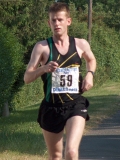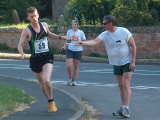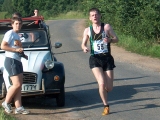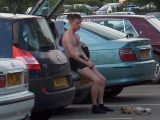Leg 10, Crimscote to Stratford (10.0 miles) - Nathan Holmes
Having supported through the day, and briefly cheered on Stuart at the start
of Leg 9, I motored off to get myself ready for Leg 10. My warm up consisted
of a short jog, a brief stretch and a long lie down under a tree, from where
I watched Kenilworth set off. I started timing the lead, got up, paced about
anxiously, drank some more and looked at my watch to check the gap. Ten
minutes. "If they're slow, I can still do this." I told myself,
but there was no sign of Stuart. I paced some more, ran out of water and sat
down again. From the shade of the timing tree I watched Leamington set off
and tried to take a split time, but pressed the wrong button on my watch. It
beeped, flashed and kept counting. Oh well. My main worry at this point was
that I'd just let Mick O'Shea drive off in my car with his eldest son
telling him to, "Open it up and see how well it goes!"
 A brief consideration of the company insurance policy later, Stuart came
into view. The distraction was altogether welcome. The Leamington runner
was, by my guess, four minutes in front but I was confident of catching him.
The plan now was to pass him then 'jog' in, knowing I had no chance of
catching Kenilworth's twenty-minute lead. According to plan, I set off as
slowly as I could convince myself to go.
A brief consideration of the company insurance policy later, Stuart came
into view. The distraction was altogether welcome. The Leamington runner
was, by my guess, four minutes in front but I was confident of catching him.
The plan now was to pass him then 'jog' in, knowing I had no chance of
catching Kenilworth's twenty-minute lead. According to plan, I set off as
slowly as I could convince myself to go.
Several eminent Biologists, and about three billion women worldwide, have
proven the inability of men to act sensibly in a competitive situation and
their limitless ability to create competitive situations out of nowhere,
apparently for the sole purpose of acting stupidly. Biologists conjecture
that this has something to do with evolution and impressing potential mates.
Women are impressed neither by being referred to as 'potential mates' by
eminent Biologists nor by said acts of pointless competitive stupidity. Men
know both these things, but when push comes to shove (which by sheer
coincidence is a common form of pointless competitive stupidity) they also
know that one small brain can only do so much in the face of millions of
years of evolution. quot;I can't run this slowly," I thought, "I'm
supposed to be racing!" and sped up.
I caught Leamington after just less than three miles and tried to slow down,
but found I still had the wrong bits between my legs. I kicked to create a
gap and pressed on up Loxley Hill.
 Loxley Hill really isn't much of a hill. People who've run Leg 10 dispute
this, but if you look at it on a map there aren't very many brown lines
between the bottom and the top, which can be considered a definitive
statement of non-hillyness. Thus reassured, I wasn't about to take it easy.
Besides, if I got a move on I could break the hour. Not a great time, but OK
on a day like this. I was feeling a bit rough, but it was a race. What did I
expect? I summited, then careered down the other side at ludicrous speed.
Loxley Hill really isn't much of a hill. People who've run Leg 10 dispute
this, but if you look at it on a map there aren't very many brown lines
between the bottom and the top, which can be considered a definitive
statement of non-hillyness. Thus reassured, I wasn't about to take it easy.
Besides, if I got a move on I could break the hour. Not a great time, but OK
on a day like this. I was feeling a bit rough, but it was a race. What did I
expect? I summited, then careered down the other side at ludicrous speed.
Through Loxley village, past halfway and no more hills to the finish, but
the temperature was biting now. Head pounding, feet burning from the heat of
the road, every breath more of an effort than the last. "I should slow
down," I thought to myself "I'm not going to catch anyone and I'll
only hurt myself." I remembered my bits. "I can break the
hour." I told myself, and pushed on. Luckily there seemed to be a
Citroen 2CV full of water parked around every corner. There must be a small
fleet of them! I'd been telling everyone else to drink lots, and I certainly
intended following my own advice. I closed my eyes and wished for more
corners.
 Several corners later, I could see Stratford on the horizon, but it looked a
long way away and the nearer I got the less I thought I was going to get
there. "I could walk for a bit," I thought to myself
"No-one's going to catch me." "I can still break the
hour." I told myself, and pushed harder. Like a good version of a bad
penny, the 2CVs just kept turning up and I kept doing what I was told:
"Keep going", "Have some water", the sort of simple
instructions that even men being pointlessly competitive can follow (so long
as a ball doesn't feature heavily in the activity).
Several corners later, I could see Stratford on the horizon, but it looked a
long way away and the nearer I got the less I thought I was going to get
there. "I could walk for a bit," I thought to myself
"No-one's going to catch me." "I can still break the
hour." I told myself, and pushed harder. Like a good version of a bad
penny, the 2CVs just kept turning up and I kept doing what I was told:
"Keep going", "Have some water", the sort of simple
instructions that even men being pointlessly competitive can follow (so long
as a ball doesn't feature heavily in the activity).
As I came into Stratford, Mark Baker hesitantly shouted to me, "Nathan,
we think you might be in the lead!" It was a clue, but I needed
something more definite. I did the maths. Three less one was still two. They
could be lost, I supposed briefly. By now my brain was fully occupied with
telling left from right and making sure I moved the right
the correct leg next. On that scale, it wasn't worth thinking about. Still,
I was in Stratford and the hour was definitely looking good.
 Stratford, it turns out, is substantially larger than I thought. I knew the
finish was opposite a petrol station, so it was an unpleasant surprise to
find that all cars in Stratford had recently been converted to run on solar
power and there wasn't a petrol station in sight. The hour came and went.
Being very tired at this point, and not kicking a ball at the time, I hadn't
the energy or inclination for petulance. I decided I might as well carry on.
Some time later I found the Stratford petrol museum and turned into the home
straight to see the finish tape very much intact and a collection of
Northbrook runners and supporters waiting to cheer me in, many of them
equally bemused by the lack of prior finishers. I raised as much of a sprint
as I could, crossed the line, received their congratulations as graciously
as I could, then staggered back to my car, which fortunately was in the same
number of pieces as before, and slumped into the boot, at which point a
number of revenge photographs were taken. (Apparently women are also
unimpressed by men taking pictures of them looking below their best in the
latter stages of races. Biologists have yet to discuss this.)
Stratford, it turns out, is substantially larger than I thought. I knew the
finish was opposite a petrol station, so it was an unpleasant surprise to
find that all cars in Stratford had recently been converted to run on solar
power and there wasn't a petrol station in sight. The hour came and went.
Being very tired at this point, and not kicking a ball at the time, I hadn't
the energy or inclination for petulance. I decided I might as well carry on.
Some time later I found the Stratford petrol museum and turned into the home
straight to see the finish tape very much intact and a collection of
Northbrook runners and supporters waiting to cheer me in, many of them
equally bemused by the lack of prior finishers. I raised as much of a sprint
as I could, crossed the line, received their congratulations as graciously
as I could, then staggered back to my car, which fortunately was in the same
number of pieces as before, and slumped into the boot, at which point a
number of revenge photographs were taken. (Apparently women are also
unimpressed by men taking pictures of them looking below their best in the
latter stages of races. Biologists have yet to discuss this.)
Shortly after finishing I discovered that Kenilworth's last leg runner had
collapsed and been taken to hospital. Almost half an hour after that, the
Leamington runner finished in second place having also suffered badly in the
heat. Yes, we had retained our title, but it felt too much like a win by
default to get excited about. All that remained was to find somewhere to buy
an ice cream, then sit by the river with Emma watching the swans go by
looking every bit as cool, graceful and relaxed as I didn't feel and try to
make myself look presentable for the presentation. Suddenly the day didn't
feel quite so bad.
A brilliant effort by all concerned. My thanks and congratulations go to
everyone involved, but in particular to Bob Adams and the Andrew family,
without whose support we might have added to the casualty list. See you all
again next year?
Nathan Holmes.
Back to Index
 A brief consideration of the company insurance policy later, Stuart came
into view. The distraction was altogether welcome. The Leamington runner
was, by my guess, four minutes in front but I was confident of catching him.
The plan now was to pass him then 'jog' in, knowing I had no chance of
catching Kenilworth's twenty-minute lead. According to plan, I set off as
slowly as I could convince myself to go.
A brief consideration of the company insurance policy later, Stuart came
into view. The distraction was altogether welcome. The Leamington runner
was, by my guess, four minutes in front but I was confident of catching him.
The plan now was to pass him then 'jog' in, knowing I had no chance of
catching Kenilworth's twenty-minute lead. According to plan, I set off as
slowly as I could convince myself to go.


